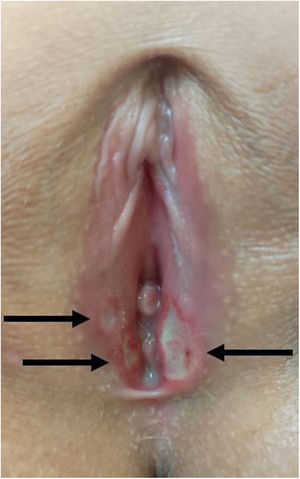Lipschütz ulcer is a rare and self-limited condition characterized by rapid onset of painful vulvar ulceration and more frequent in adolescent girls. It has been linked to infection and it is not associated with sexually transmitted infections (STIs).1–3
A previously healthy and sexually inactive girl aged 11 years presented dysuria of 2 days’ duration resulting in urinary retention. She had been diagnosed with active SARS-CoV-2 infection 5 days before admission, accompanied by fever in the first 3 days and without any respiratory symptoms. The patient had no history of recurrent oral/genital ulcers nor a family history of Behçet or Crohn disease.
The physical examination revealed a full, distended bladder, 3 painful vulvar ulcers (Fig. 1) and vaginal exudate. The hymen was intact.
Previous evidence suggests that acute genital ulcers can develop as a manifestation of primary infection by viruses such as Epstein-Barr virus (EBV), cytomegalovirus (CMV) or, more recently, SARS-CoV-2. Testing excluded infection by CMV, EBV, adenoviruses and influenza A and B and STIs including infection by herpes simplex virus type 1/2, Chlamydia trachomatis, Haemophilus ducreyi and human immunodeficiency virus and syphilis. Lipschütz ulcer was suspected upon detection of SARS-CoV-2 by reverse transcription polymerase chain reaction in a nasopharyngeal swab sample.
The patient was treated with topical fusidic acid and lidocaine 2%. At 10 days, she exhibited clinical improvement and had developed a residual scar (Fig. 2).
Lipschütz ulcer should be considered in the differential diagnosis of painful vulvar ulceration.2 There are a few cases reported in the literature in association with SARS-CoV-2 infection1,4 or administration of the SARS-CoV-2 mRNA vaccine.3,5,6 Complete resolution is expected, and early treatment is essential to avoid complications like urinary retention.1








